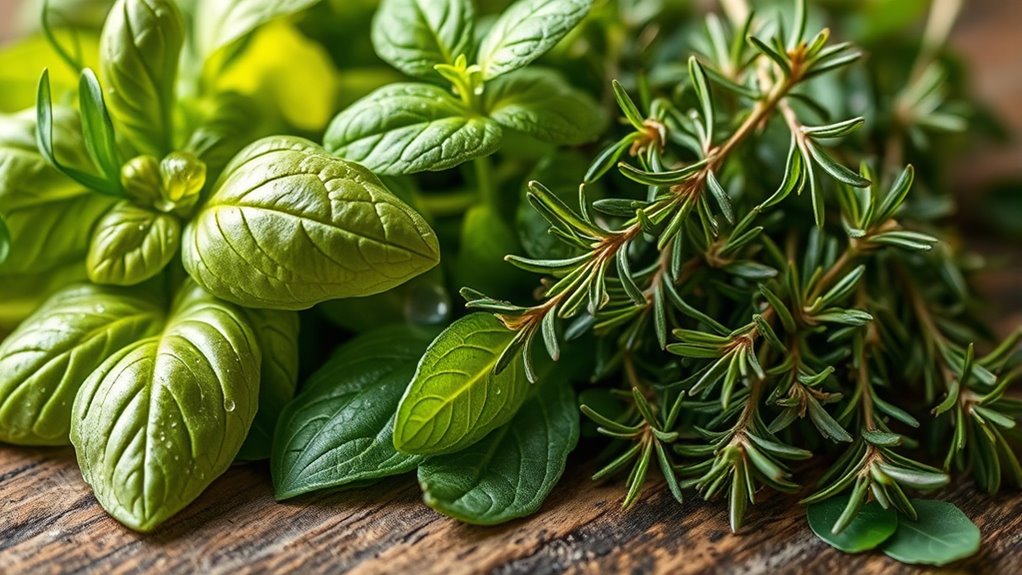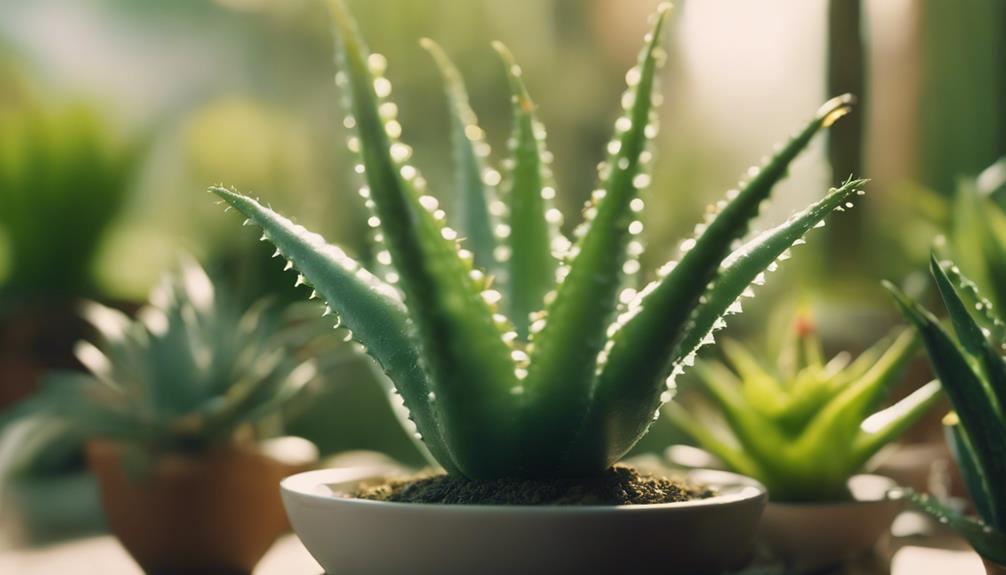Herbal remedies claimed to prevent gray hair are mainly based on traditional beliefs rather than solid scientific proof. While herbs like Amla, Henna, and Curry Leaves are thought to support hair pigmentation and delay graying, rigorous studies are limited and results are inconclusive. Factors like genetics and age play bigger roles, making these herbs more myth than proven fact. To learn more about what science really says about herbal hair treatments, keep exploring the facts behind these popular remedies.
Key Takeaways
- Some herbs like Amla and Curry Leaves contain antioxidants that may support melanin production, but scientific evidence is limited.
- Herbal remedies may delay gray hair temporarily but are unlikely to prevent it entirely due to genetic and age factors.
- Clinical studies on herbs for gray hair are scarce, with most available data being anecdotal or inconclusive.
- Potential risks include allergies, interactions, and inconsistent herbal formulations, emphasizing the need for professional consultation.
- Overall, herbs may help maintain hair health but are not proven to definitively prevent or reverse gray hair.
Understanding the Causes of Gray Hair
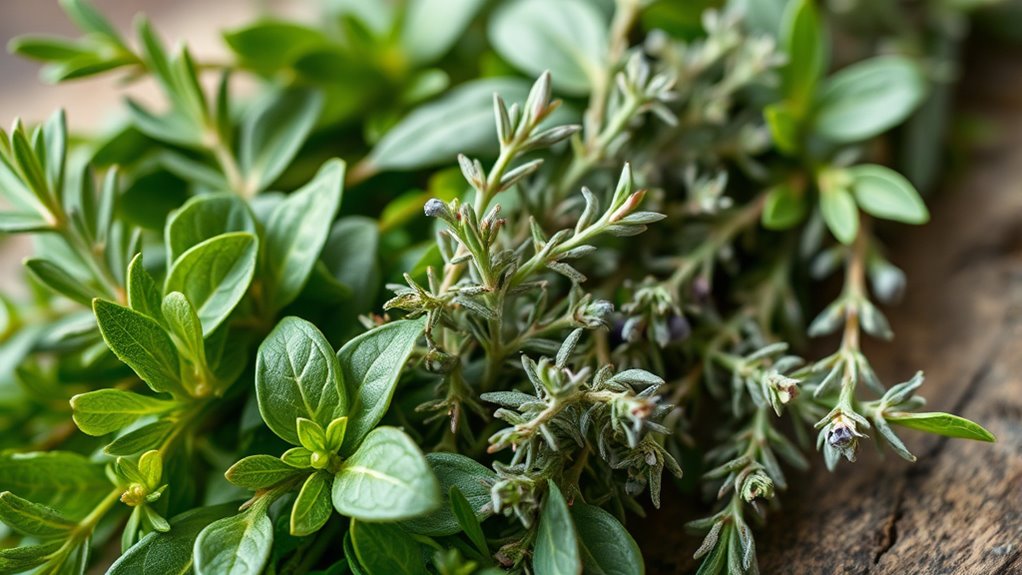
Gray hair occurs when your hair follicles reduce melanin production, the pigment responsible for your natural color. As you age, your body’s ability to produce melanin declines, leading to loss of color in your hair. Genetics also play a significant role; if your family grays early, you’re more likely to do the same. External factors like stress, poor nutrition, and exposure to pollutants can accelerate this process. Additionally, health conditions such as thyroid disorders or vitamin deficiencies can contribute to premature graying. Understanding these causes helps you see that graying isn’t solely about aging but involves a complex interplay of genetics, lifestyle, and health. Recognizing these factors empowers you to take proactive steps to potentially delay the process.
Common Herbs Believed to Delay Graying
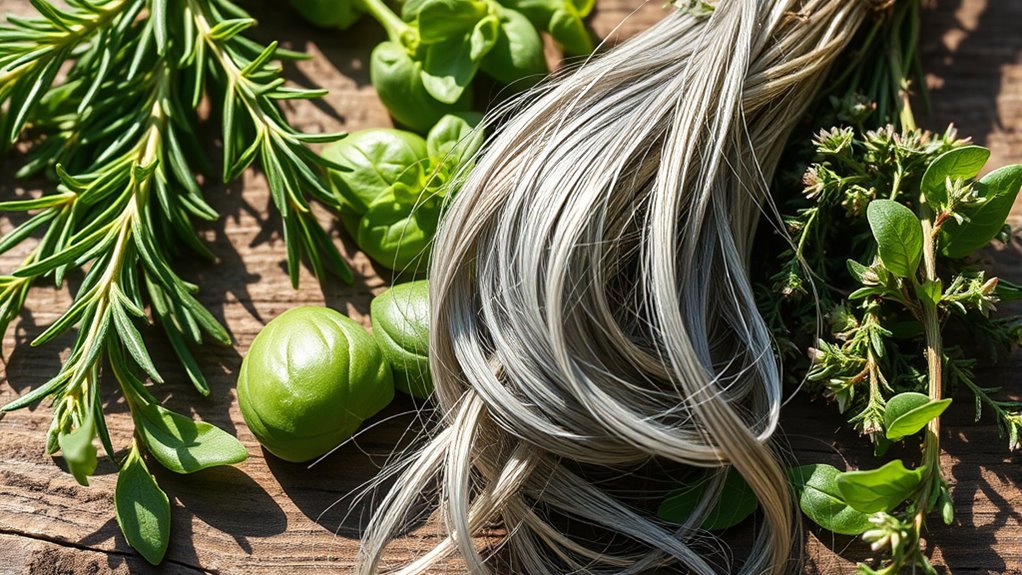
Many herbs have been traditionally believed to help delay the onset of gray hair by nourishing hair follicles and promoting melanin production. These herbs include those used in ancient remedies and folk traditions. You might have heard of or tried some like amla, henna, or black seed oil, which are popular for hair health. While scientific evidence remains limited, many trust these herbs for their nourishing effects. Here’s a quick overview:
| Herb | Known Benefits |
|---|---|
| Amla | Rich in antioxidants, boosts melanin |
| Henna | Conditions hair, strengthens follicles |
| Black Seed Oil | Promotes scalp health, nourishes roots |
| Curry Leaves | Contains antioxidants, may delay graying |
The Science Behind Herbal Effects on Hair Pigmentation
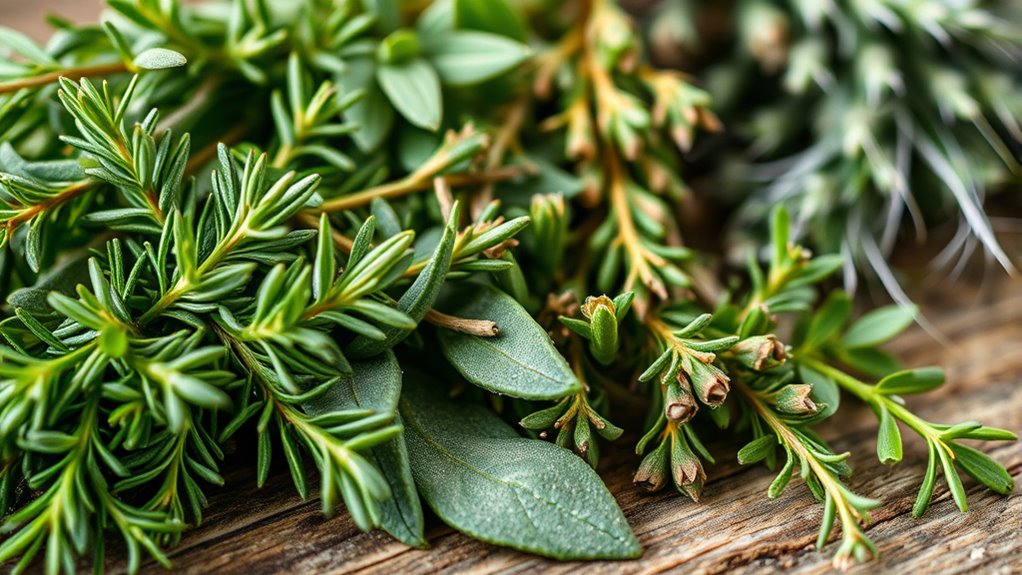
Herbs may influence hair pigmentation by affecting melanin production and nutrient delivery to hair follicles. However, scientific studies on these effects are limited and often inconclusive. Understanding how herbs work requires examining both their impact on hair color and the current research gaps.
Herbal Impact on Melanin
Understanding how herbal remedies influence melanin production can shed light on their potential to maintain natural hair color. Some herbs contain compounds that may stimulate melanocyte activity, helping your hair retain pigment longer. These active ingredients can either boost melanin synthesis or prevent its breakdown. For example, certain herbs:
- Contain antioxidants that protect melanocytes from oxidative stress
- Include bioactive compounds that stimulate melanin production
- Help reduce inflammation around hair follicles
- Might inhibit enzymes that cause melanin degradation
While research is ongoing, many herbs are believed to support melanin levels naturally. Their impact depends on the specific plant and how it’s prepared. Ultimately, understanding these mechanisms can help you choose herbal options that may support your hair’s natural color.
Nutrients and Hair Color
Nutrients play a crucial role in determining your hair’s natural color by supporting the health and function of melanocytes—the cells responsible for producing pigment. Without key nutrients, these cells can weaken, leading to premature graying. Vitamins like B12 and biotin, minerals such as copper and zinc, and antioxidants like vitamin E help maintain melanin production. For example, copper is essential for melanin synthesis, while antioxidants combat oxidative stress that damages melanocytes. Here’s a quick look:
| Nutrient | Role in Hair Pigmentation |
|---|---|
| Vitamin B12 | Supports cell renewal |
| Copper | Essential for melanin synthesis |
| Zinc | Promotes overall hair health |
| Vitamin E | Protects against oxidative stress |
Ensuring adequate intake may help preserve your natural hair color longer.
Scientific Evidence Limitations
While many herbal remedies are touted for their potential to prevent or reverse gray hair, scientific evidence supporting these claims remains limited. Most studies are small, lack control groups, or rely on anecdotal reports, making it hard to draw firm conclusions. Additionally, variables like dosage, preparation, and individual differences affect outcomes. You should also consider that hair pigmentation involves complex biological processes that herbs may not influence markedly.
Here are some key limitations:
- Limited human clinical trials
- Small sample sizes
- Variability in herbal formulations
- Lack of standardized testing methods
Because of these factors, it’s difficult to confirm if these herbs genuinely impact hair pigmentation or if perceived effects are placebo. More rigorous research is necessary to establish any real scientific basis for these herbal claims.
Evaluating the Evidence: What Studies Show
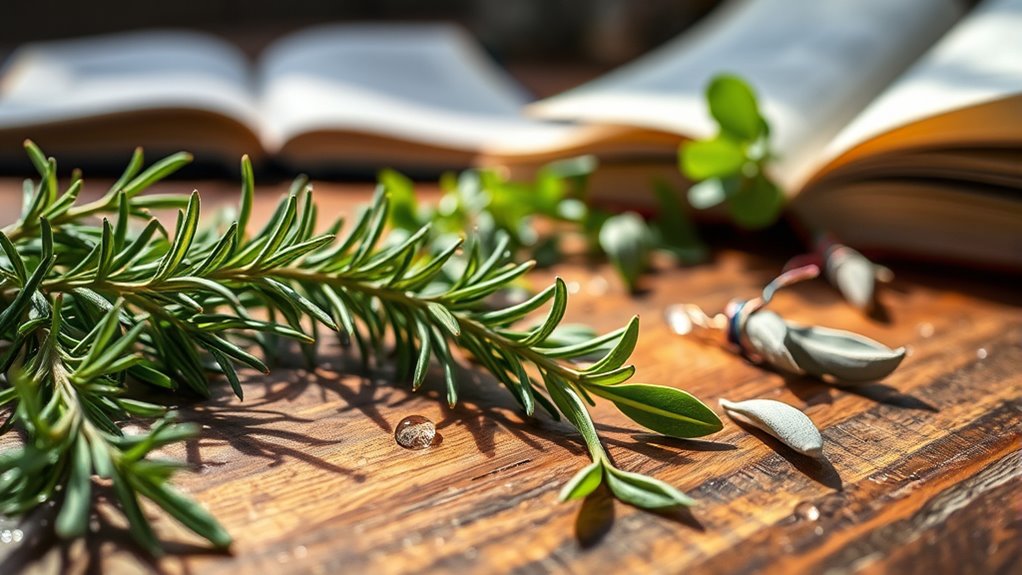
Although research on herbs to prevent gray hair is still emerging, several studies have attempted to evaluate their effectiveness. Some research suggests that certain herbs, like amla and rosemary, may support hair pigmentation by strengthening hair follicles and improving circulation. In one small study, participants using herbal extracts experienced delayed graying compared to controls, but the sample size was limited. Other studies have looked at antioxidant-rich herbs, proposing they reduce oxidative stress that contributes to hair aging. However, many of these studies lack rigorous design or large populations, making their results inconclusive. Overall, while some evidence hints at potential benefits, current scientific data doesn’t definitively prove that herbs can prevent or reverse gray hair. More extensive research is needed to establish clear, evidence-based claims.
Potential Risks and Limitations of Herbal Remedies
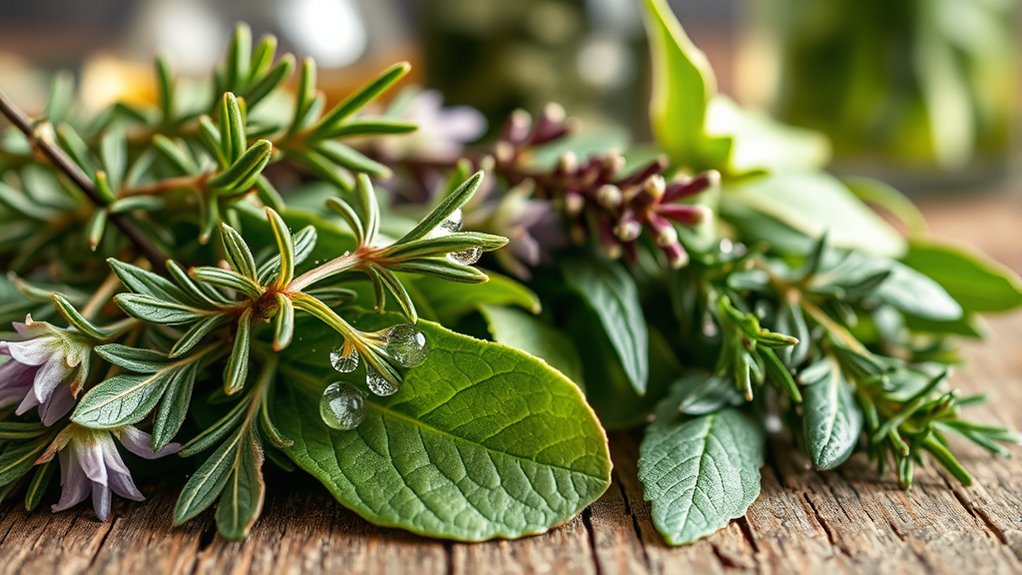
Herbal remedies for preventing gray hair can pose several risks and limitations that you should consider. First, natural doesn’t always mean safe; some herbs may cause allergic reactions or interact with medications you’re taking. Second, herbal remedies lack standardized dosages, making it hard to determine effective or safe amounts. Third, the quality and potency of herbs can vary widely between brands, leading to inconsistent results. Fourth, relying solely on herbs might delay seeking professional medical advice for underlying health issues affecting hair color. Be cautious, especially if you have existing health conditions or are pregnant. Always research thoroughly and consult a healthcare professional before starting any herbal treatment to avoid adverse effects and ensure safe use.
Practical Tips for Maintaining Hair Health Naturally
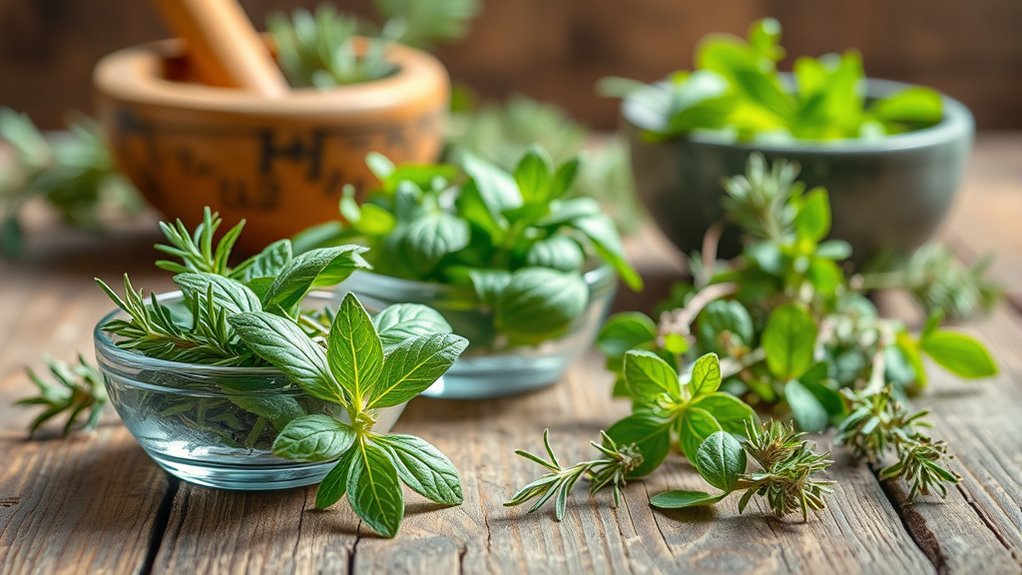
To keep your hair healthy naturally, focus on eating a nourishing diet rich in vitamins and minerals that support hair strength. Use gentle hair care routines, avoiding harsh chemicals and excessive heat that can damage your strands. By making these simple changes, you’ll promote stronger, healthier hair from the inside out.
Nourishing Hair Diet
A nourishing hair diet plays a vital role in maintaining healthy, vibrant hair and preventing premature graying. To support hair health, focus on incorporating nutrient-rich foods into your daily meals. Make certain you’re getting enough vitamins and minerals essential for hair growth.
- Include leafy greens like spinach and kale for iron and antioxidants.
- Add nuts and seeds, such as almonds and chia seeds, for healthy fats and zinc.
- Consume lean proteins like chicken, fish, or beans to supply amino acids for keratin production.
- Eat fruits rich in vitamin C, like oranges and berries, to boost collagen and improve scalp circulation.
Gentle Hair Care
Maintaining healthy hair isn’t just about what you eat; how you care for your hair daily makes a big difference. Use gentle shampoos free of harsh chemicals to avoid stripping natural oils. Avoid excessive washing—two to three times a week is enough—to prevent dryness. When you shampoo, massage your scalp softly to stimulate circulation without causing damage. Always follow up with a nourishing conditioner to keep hair hydrated and manageable. Limit heat styling tools like straighteners and curling irons, or use them on low heat with a heat protectant. Regularly detangle your hair with a wide-tooth comb, starting from the ends and working upward. These simple habits protect your hair’s natural strength, reducing breakage and promoting healthier growth over time.
Future Directions in Herbal Hair Care Research
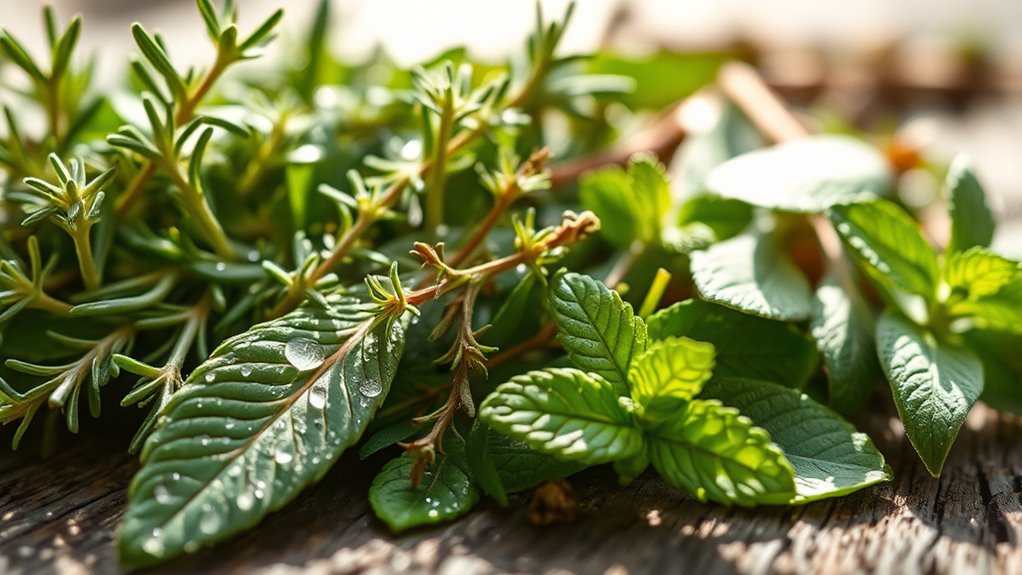
As herbal hair care research advances, scientists are increasingly focusing on identifying specific compounds that can effectively prevent or delay gray hair. Your future might see targeted herbal formulations that enhance melanin production or protect hair follicles from oxidative stress. Researchers are exploring plant-based antioxidants, bioactive molecules, and novel delivery systems to improve efficacy. Additionally, combining traditional herbs with modern technology could lead to personalized treatments for hair pigmentation issues.
- Developing standardized extracts for consistent results
- Using nanotechnology to boost compound absorption
- Conducting clinical trials to validate effectiveness
- Investigating genetic factors influencing herbal responsiveness
Frequently Asked Questions
Can Herbal Remedies Completely Prevent or Reverse Gray Hair?
Think of herbal remedies as hopeful whispers rather than magic spells. While some herbs might slow down graying or improve hair health, they can’t completely prevent or reverse gray hair. Your hair’s color change is largely due to genetics and aging. So, while herbs can support overall hair health and possibly delay graying, they won’t turn back the clock entirely. Embrace your natural beauty, and enjoy the journey!
Are There Specific Herbs Best Suited for Different Hair Types?
Yes, certain herbs suit different hair types. For oily hair, you might try rosemary or sage to balance scalp oil, while for dry hair, chamomile or calendula help hydrate and soothe. If your hair is sensitive, aloe vera or lavender can reduce irritation. Choose herbs based on your hair’s needs, and always do a patch test to avoid allergic reactions. Tailoring herbal remedies can improve your hair’s health and appearance.
How Long Does It Typically Take to See Results From Herbal Treatments?
You can typically see results from herbal treatments in about 4 to 6 months, but it varies based on your hair condition and consistency. Regular use is key, and patience is essential since herbs work gradually. Keep in mind, individual responses differ, so some people might notice changes sooner while others may take longer. Staying consistent and managing expectations will help you track your progress effectively.
Do Herbal Treatments Work Better When Combined With Other Hair Care Practices?
Like a skilled chef blending ingredients, combining herbal treatments with good hair care practices enhances their effectiveness. You’ll likely notice better results when you include a balanced diet, gentle shampoos, and scalp massages alongside herbs. Think of it as building a strong foundation, much like a well-constructed house. This holistic approach supports hair health, helping you achieve your desired look faster and more naturally.
Are There Any Age-Related Factors Influencing Herbal Effectiveness Against Graying?
Age can influence how effective herbal remedies are against graying. As you get older, your hair follicles may become less responsive to these treatments, making them less effective over time. You might notice better results when you’re younger or in early stages of graying. However, individual factors like genetics and overall health also play a role, so herbal remedies may not work the same for everyone regardless of age.
Conclusion
Think of your hair like a garden—nurture it with patience and care. While herbs might help, they’re not magic wands that stop gray hair overnight. Remember, just as a healthy plant needs consistent watering, your hair benefits from balanced nutrition and gentle care. Don’t rely solely on herbs; instead, embrace a holistic approach. With time and attention, you’ll see your hair flourish, proving that natural care is a journey, not a quick fix.

